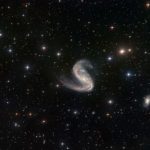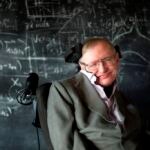Stephen Hawking and Viatcheslav Mukhanov, Frontiers of Knowledge award for discovering how galaxies formed
Physicists Stephen Hawking and Viatcheslav Mukhanov have been distinguished with the BBVA Foundation Frontiers of Knowledge Award in Basic Sciences for discovering that quantum fluctuations triggered the formation of galaxies formed during the first phase of the evolution of the Universe. The jury underscored that this insight, now borne out by space telescope observations, is a fundamental result in cosmology.

Matter comes together in the Universe to form galaxies, clusters of galaxies and superclusters of galaxies. These large structures have been growing for a little over 13 billion years, since the Big Bang set the Universe on its expansion course. But, how did this process start? Why did matter begin to accumulate?
In the early 1980s, Hawking and Mukhanov came to the same, independent conclusion: that quantum fluctuations in the newborn Universe acted as seeds that would eventually grow into galaxies. At the time, no one envisioned that this hypothesis could one day be experimentally validated, but in 2013, a European satellite provided a decisive match for the two men’s predictions.

Physicist Stephen Hawking, BBVA Foundation Frontiers of Knowledge Award in Basic Sciences
Finding the embryos of galaxies
As the jury states in its citation, “Stephen Hawking and Viatcheslav Mukhanov proposed that microscopic quantum fluctuations were at the origin of the observable large scale structure of the Universe. This insight, now borne out by space telescope observations, is a fundamental result in cosmology.”
As Mukhanov himself, currently Professor of Cosmology at Ludwig-Maximilians Universität in Munich, explains: “we came to the idea that maybe the same physics which is responsible for the structure of matter at very small, atomic scales is also responsible for the Universe’s large scale structure. It sounds crazy but we shouldn't forget that in the past, the Universe was extremely small, and that therefore quantum mechanics could equally well explain how the embryos of the galaxies were formed.”

Russian physicist Viatcheslav Mukhanov.
Briton Stephen Hawking, Director of Research at the Centre for Theoretical Cosmology at Cambridge University, is probably better known for his foundational contributions to the physics of black holes. His prediction that black holes not only absorb matter and energy but also emit what has become known as Hawking’s radiation owes likewise to the application of quantum theory to black wholes, but has yet to meet with experimental confirmation.
Conversely, the work earning him this award may, in the words of the jury, be regarded as “the single most significant experimentally confirmed achievement that brings together fundamental theoretical particle physics and cosmology.”
Stephen Hawking was born in Oxford on January 8, 1942, the 300th anniversary of the death of Galileo Galilei. He wanted to study mathematics at the University, but as the degree was not available at that time at Oxford, he enrolled instead in Natural Sciences, going on to specialize in physics. He then moved to Trinity College Cambridge, where he obtained a PhD in cosmology.
Aged 24, he won the Adam Prize, awarded by the Mathematics Faculty at Cambridge, for his study “Singularities and the Geometry of Space-Time” and at the age of 32 was elected to membership of the Royal Society. That same year he began his research into black holes, postulating that after the Big Bang tiny black holes were formed, and that these primitive black holes had to thermally create and release particles, the so-called “Hawking radiation.”
From 1979 until his retirement in 2009, he occupied the Lucasian Professorship of Mathematics at the University of Cambridge, created in 1663 with Isaac Newton as its second incumbent. He then took up the post of Director of Research at the same university’s Centre for Theoretical Cosmology.
Hawking is also a celebrated writer, with such popular titles to his name as A Brief History of Time: From the Big Bang to Black Holes, The Universe in a Nutshell and The Great Design.
Viatcheslav Mukhanov (Kanash, former USSR, 1952), was interested in physics from early childhood. In 1972, he enrolled at the Institute for Nuclear Research in Moscow, focused on applied physics. “I was more interested in the sky, the stars and general relativity,” but “only 20 out of every 600 students got the chance to study theoretical physics. They were also split into two groups, at the Landau and Lebedev institutes.” His good academic performance finally gained him entry to the latter group, led by Vitali Ginzburg, winner of the 2003 Nobel Prize for his work on superconductivity.
During his doctorate studies, he worked on developing a new theory that would explain how galaxies were formed better than the existing ones at that time. Unhappy with the results of his research, he crossed paths with Gennady Chibisov, a colleague ten years older, who suggested the idea of quantifying the irregularities found in order to thus explain the origin of the universe’s structure.
“I spent almost a year doing calculations. The formulas took up page after page, with little hope of extracting anything useful.” And in May 1981, JETP Letters published his predictions under the title “Quantum Fluctuations and a Non Singular Universe”. In 1988, he received the gold medal of the USSR Academy of Sciences.
In the early 1990s, with the collapse of the USSR, he met cosmologist Robert Branderberger, and embarked on an article on cosmological perturbations which earned him a postdoctoral place at the Swiss Federal Institute of Technology in Zurich. He remained there for five years until taking up his present post as Professor of Cosmology at the Ludwig-Maximilians Universität in Munich.